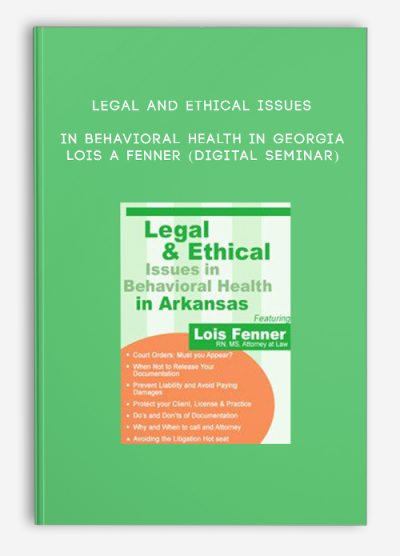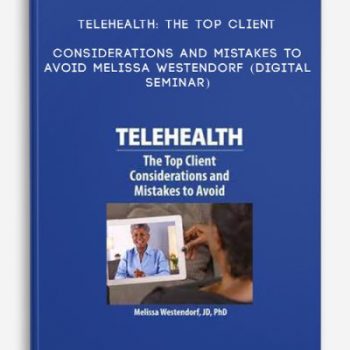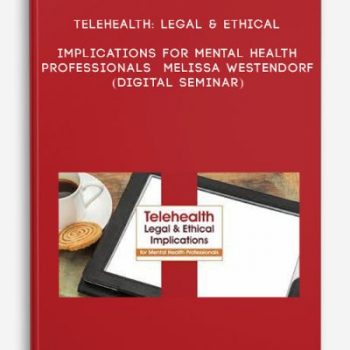Legal and Ethical Issues in Behavioral Health in Georgia – LOIS A FENNER (Digital Seminar)
Description:
Without the proper legal awareness needed to stay in compliance, you may face grave legal and financial consequences. This recording will show you how to continue to help the people you’ve been trained to help while still protecting yourself from many legal pitfalls. If you purchase only one seminar this year, make it this one.
Attorney Lois Fenner will lead you throughout an entertaining and enlightening day, leaving you with a greater understanding of the latest Georgia laws as they relate to behavioral health. You will take home practical strategies to minimize and manage legal and ethical risks and you will learn how to immediately implement these risk-reducing strategies into your practice.
Outline:
Overview/Confidentiality of Mental Health Records
- When and to Whom Records Can Be Released
- Mandatory Disclosure Requirements
- Alcohol/Drug and AIDS/HIV Treatment Records
- Necessary Documentation
HIPAA 101 – Federal Confidentiality Regulations
- What is HIPAA Today?
- How Do I Comply with the Regulations?
- What Are “Psychotherapy Notes”?
- When May I Release Records?
- How Much Paperwork Will This Be for My Office?
Responding to Subpoenas, Court Orders and Law Enforcement
- Subpoenas: Types of Subpoenas; Duty to Respond; Time Limits
- Search Warrants & Court Orders
- Authority to Obtain Information
- Investigations
- Development of Policies and Procedures to Respond
Balancing the Rights of Minors & Parents
- Minors’ Rights
- Age of Majority
- Access to Records
- Rights of Minors to Refuse/Consent to Medication and Treatment
- Alcohol, Drug Abuse and Treatment Issues for Minors
- Parental Rights
- Custodial and Divorce Factors
- Child Abuse Allegations
- Custodial vs. Non-Custodial Parent’s Rights to Records
Voluntary and Involuntary Mental Health Commitments
- Reasons to Use a Voluntary Commitment or an Involuntary Commitment
- Grounds for an Involuntary Commitment: Dangerousness (As Defined by Statute)
- Mental Illness
- Procedures
Professional Ethics and Boundary Issues
- Consent Elements and Competency Issues
- Medication: Right to Refuse
- Restraints and Seclusion
- Individual’s Legal Rights
- Informed Consent
- Boundary Issues: Where the Lines Are Blurred
- Prescribing Practices
- Board of Health Professionals Investigation – Disciplinary Proceedings
Legal Liabilities of the Professional
- Duty to Warn Issues
- Professional Obligations and Standards
- Fraud & Abuse Issues
- Billing & Coding Errors
- Documentation
- Compliance with Contradictory Laws
FITNESS – HEALTH – MEDICAL Course
More information about Fitness:
Regular exercise and physical activity promotes strong muscles and bones. It improves respiratory, cardiovascular health, and overall health.
Staying active can also help you maintain a healthy weight, reduce your risk for type 2 diabetes, heart disease, and reduce your risk for some cancers.
Moderate aerobics exercises 3 times a week for 30 minutes can reduce cancer risk Cancer-based exercises provide relief to the patient during
cancer treatment There are many benefits to exercising. But it’s even more beneficial for cancer patients.
This has been proven in research published in the medical journal ‘Cancer Journal for Clinicians’.
Preview Information:
Original Page
Archive Page
More Course: FITNESS – HEALTH – MEDICAL
Outstanding Course:John Meadows – The Taskmaster














Lord –
This is Digital Download service, the course is available at Vincourse.com and Email download delivery.